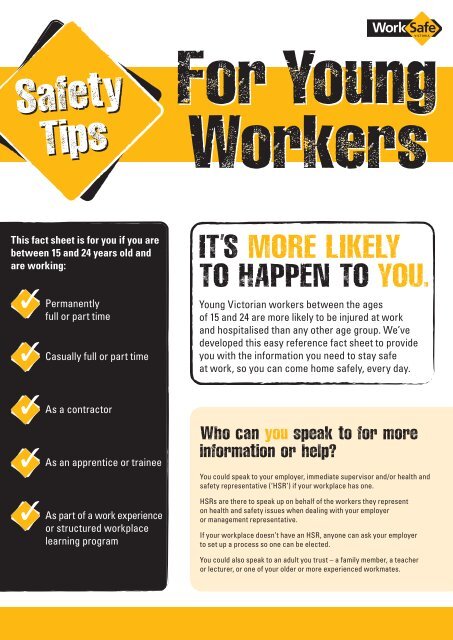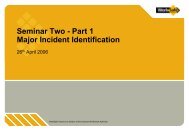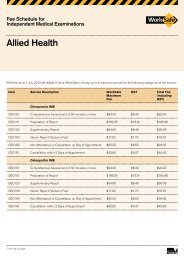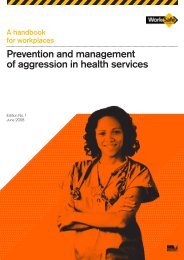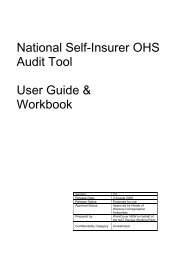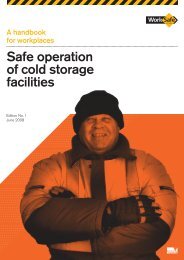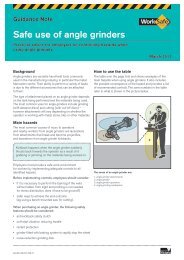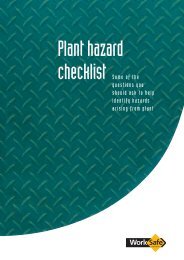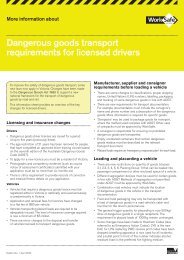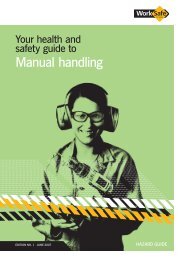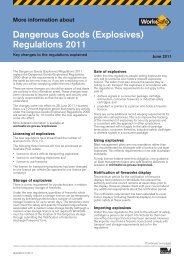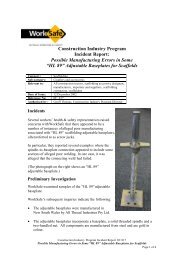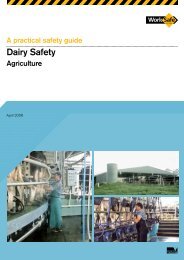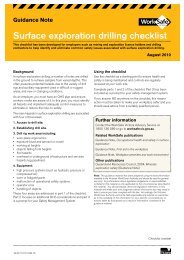Safety Tips for Young Workers - WorkSafe Victoria
Safety Tips for Young Workers - WorkSafe Victoria
Safety Tips for Young Workers - WorkSafe Victoria
You also want an ePaper? Increase the reach of your titles
YUMPU automatically turns print PDFs into web optimized ePapers that Google loves.
For <strong>Young</strong><br />
<strong>Workers</strong><br />
This fact sheet is <strong>for</strong> you if you are<br />
between 15 and 24 years old and<br />
are working:<br />
Permanently<br />
full or part time<br />
Casually full or part time<br />
It , s more likely<br />
to happen to you.<br />
<strong>Young</strong> <strong>Victoria</strong>n workers between the ages<br />
of 15 and 24 are more likely to be injured at work<br />
and hospitalised than any other age group. We’ve<br />
developed this easy reference fact sheet to provide<br />
you with the in<strong>for</strong>mation you need to stay safe<br />
at work, so you can come home safely, every day.<br />
As a contractor<br />
As an apprentice or trainee<br />
As part of a work experience<br />
or structured workplace<br />
learning program<br />
Who can you speak to <strong>for</strong> more<br />
in<strong>for</strong>mation or help?<br />
You could speak to your employer, immediate supervisor and/or health and<br />
safety representative (‘HSR’) if your workplace has one.<br />
HSRs are there to speak up on behalf of the workers they represent<br />
on health and safety issues when dealing with your employer<br />
or management representative.<br />
If your workplace doesn’t have an HSR, anyone can ask your employer<br />
to set up a process so one can be elected.<br />
You could also speak to an adult you trust – a family member, a teacher<br />
or lecturer, or one of your older or more experienced workmates.
So who is responsible <strong>for</strong> workplace health and safety?<br />
Your employer’s responsibilities:<br />
Your responsibilities:<br />
To provide a safe and healthy workplace<br />
Your employer must make sure that your conditions<br />
of work are safe and healthy, regardless of the type and<br />
terms of your employment.<br />
This includes protecting you from both physical and<br />
psychological workplace hazards such as slippery floors,<br />
lifting heavy loads, faulty machinery, bullying, violence,<br />
fatigue and work-related stress.<br />
To provide training and supervision<br />
Your employer must make sure that you have enough<br />
in<strong>for</strong>mation, training and supervision to enable you to work<br />
safely. This training should:<br />
• Show you how to do your job safely and how to recognise<br />
and report hazards on the job.<br />
• Provide and show you how to use the necessary<br />
equipment, and how to safely wear and use any protective<br />
gear such as gloves, safety footwear and goggles.<br />
• Help you get to know the layout of the workplace, your<br />
immediate supervisor, health and safety representative<br />
and workmates.<br />
To talk health and safety<br />
Your employer has a responsibility to share in<strong>for</strong>mation<br />
with you regarding workplace health and safety matters.<br />
This includes:<br />
• Asking <strong>for</strong> your input when looking at any workplace<br />
hazards and ways to control those hazards.<br />
• Discussing new equipment when it is introduced into<br />
your work area.<br />
• Discussions at team or toolbox meetings.<br />
• Discussions with your health and safety representative.<br />
To work safely<br />
You must look after yourself by working safely, following<br />
workplace procedures and not putting your workmates<br />
at risk.<br />
To ask if you’re not sure<br />
Know and follow all the health and safety requirements that<br />
affect your job. If you don’t know how to do something safely,<br />
or aren’t sure, ask <strong>for</strong> help or training be<strong>for</strong>e you begin the<br />
task. Work is important, but your life is more important.<br />
Here are some ways you could raise an issue with your<br />
immediate supervisor:<br />
“I’m not sure how this works. Could you spare a few minutes<br />
to show me again?”<br />
“I think I’ve got the hang of this, but can you watch to make<br />
sure I’m doing everything right?”<br />
“I’m still a bit uncom<strong>for</strong>table with this. Would you mind<br />
explaining it/showing me again?”<br />
To report your concerns<br />
If you are concerned about your own or your workmates’<br />
health and safety, talk to your employer, immediate<br />
supervisor and/or health and safety representative straight<br />
away. This might be about faulty equipment, slippery floors,<br />
lack of protective gear or bullying and violence at work.<br />
You should also speak to your teacher about your concerns<br />
if you are a work experience or structured workplace<br />
learning student.<br />
If you need more help or in<strong>for</strong>mation, you can anonymously<br />
call <strong>WorkSafe</strong> <strong>Victoria</strong> on 1800 136 089 (toll free).<br />
Want to know more?<br />
There is other in<strong>for</strong>mation you can take a look at including the Your Health and <strong>Safety</strong> Guide<br />
to Managing <strong>Young</strong> <strong>Workers</strong> booklet, downloadable from the <strong>WorkSafe</strong> website.<br />
Visit worksafe.vic.gov.au/youngworkers<br />
Call the <strong>WorkSafe</strong> Advisory Service <strong>for</strong> advice on 1800 136 089 (toll free).<br />
VWA1119/01/12.07 <strong>Safety</strong> <strong>Tips</strong> <strong>for</strong> <strong>Young</strong> <strong>Workers</strong><br />
VWA0117


